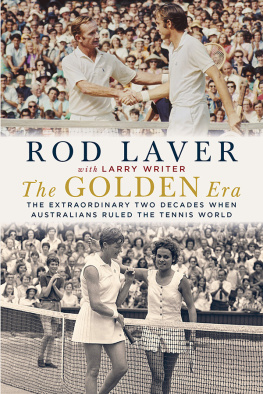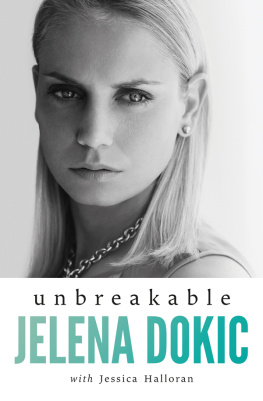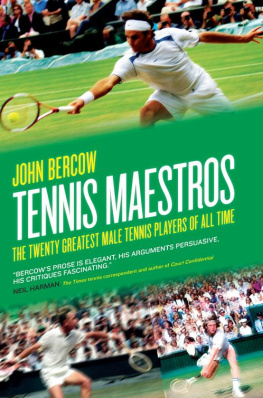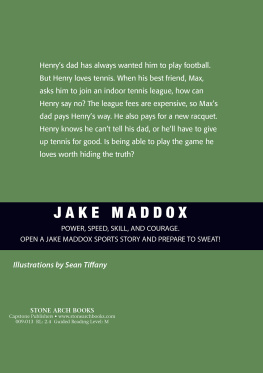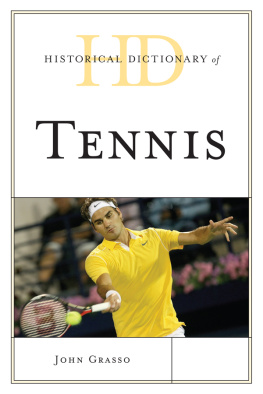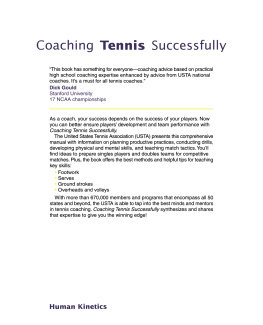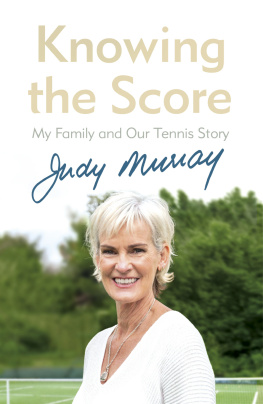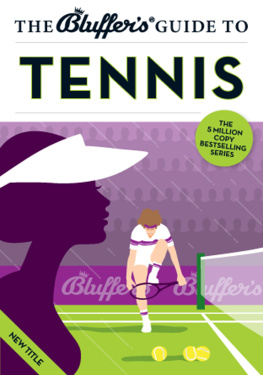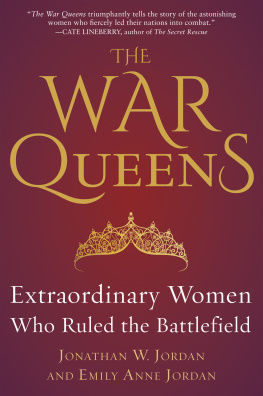First published in 2019
Copyright Rod Laver 2019
All rights reserved. No part of this book may be reproduced or transmitted in any form or by any means, electronic or mechanical, including photocopying, recording or by any information storage and retrieval system, without prior permission in writing from the publisher. The Australian Copyright Act 1968 (the Act) allows a maximum of one chapter or 10 per cent of this book, whichever is the greater, to be photocopied by any educational institution for its educational purposes provided that the educational institution (or body that administers it) has given a remuneration notice to the Copyright Agency (Australia) under the Act.
Every effort has been made to trace the holders of copyright material. If you have any information concerning copyright material in this book please contact the publishers at the address below.
Allen & Unwin
83 Alexander Street
Crows Nest NSW 2065
Australia
Phone: (61 2) 8425 0100
Email:
Web: www.allenandunwin.com

ISBN 978 1 76052 910 9
eISBN 978 1 76087 270 0
Index by Garry Cousins
Set by Midland Typesetters, Australia
Jacket design: Deborah Parry Graphics
Front cover photography: Rod Laver defeats John Newcombe, Wimbledon mens singles final, 1969 (Rolls Press/Popperfoto/Getty Images); Margaret Court defeated by Evonne Goolagong, Wimbledon ladies singles final, 1971 (Popperfoto/Getty Images)
To the grand players who created Australian tenniss golden era in the 1950s, 60s and early 70s. And to those great Australian champions who came before and after us.
My life and career have been enriched by my connections with Australia. Each time I visit, Mirka, our children and I are made so welcome by Australians, and two of my coaches, men who helped make me the player and man Ive become, were Australian.
Peter Carter, from Adelaide, was my first coach. He discovered me at the Old Boys tennis club in Basel when I was a starry-eyed nine-year-old and he saw something in me, and took me under his wing. Peter was always determined that I should not waste my talent, and I thank him for my technique and temperament. He taught me to respect the game and those who play it. Peter died aged just 37 in a car crash while on his honeymoon in South Africa in 2002, the year before I won my first grand slam title at Wimbledon. If only he could have been there to share in the victory in which he played so large a part. I wish he was around to see all the great matches since. After Peter died, I worked harder than I had ever worked before. I didnt want to let him down. He is still in my heart.
Tony Roche was my coach for three years from 2005. He was old school and he instilled in me the core values that had allowed him and the great Australian champions of the 50s, 60s and 70s, whose deeds are celebrated in this book, to dominate world tennis for so long. Tony taught me the importance of high personal standards and a strong work ethic, of being fit and strong and mentally toughtough enough to play at your best for hour after hourthe qualities necessary to take it to the limit in five-set matches.
Coming to play the Australian Open at Rod Laver Arena in Melbourne each January has long been a highlight of my year. Rockets arena has been kind to me. Ive won six singles titles thereso farand it was in the lead-up to the 2006 Australian Open final that I met Rod for the first time. Id always revered him for his extraordinary achievements. His great mate Tony Roche introduced us and we hit it off immediately. We found we had much in common. Wed won a few titles between us, are both naturally shy family men, and the heritage of tennis is important to us. We both played tennis hard, with flair and in the right spirit, learned to rise to the occasion and play well for long periods under pressure. Rocket inspired me. When I won the title in 06, Rod presented me with the Sir Norman Brookes Challenge Cup, and it was an overwhelming experience which will remain one of the most memorable moments in my life.
Rod and Tony and the Australian champions of the golden eraFrank Sedgman, Lew Hoad, Ken Rosewall, Neale Fraser, Roy Emerson, John Newcombe and the restbrought glamour and global sporting success to Australia, proving that a small-in-population, faraway country could cut it on the world stage in a truly international sport. They drew Australians together, made them feel good about themselves, made them proud.
And they created their legends in rough and ready times. They played for nothing in the amateur era, defected to the gruelling pro circuit where they made their money the hard way, and then pioneered open tennis We modern players have reaped the benefits of their tribulations and triumphs. I, along with many others, walk in their footsteps.
Its a pleasure and a privilege to write this foreword to their story.
Roger Federer
August 2019
It is a colossal tribute to the champions of Australias golden era that Roger Federer, who gets my vote as the greatest player of all time, has taken time out to write the foreword to this book. I think I can speak for all the Australian champions of our era when I say that we all hold Roger in the highest esteem, as a champion and as a person, for his record and for the way he plays the game. Roger epitomises everything that is superb about our great game.
My thanks to my tennis peers and players who were such a part of Australian tenniss golden era, for spending many hours sharing their memories and insights, and for allowing us to quote passages from their memoirs. To Mal Anderson, Ashley Cooper, Margaret Court, Roy Emerson, Neale Fraser, Jenny Hoad, John Newcombe, Tony Roche, Ken Rosewall, Frank Sedgman and Fred Stolle, this is your book, and it could not have been researched and written without you. Thank you, too, to the loved ones of the champions for your generosity: Gary Anderson, Ann Marie Bennett, Helen Cooper, Barry Court, Joy Emerson, Angie Newcombe, Jean Sedgman, Wilma Rosewall.
To interview my tennis contemporaries, co-author Larry Writer travelled around Australia, to Spain, England and the United States. Larrys deep research into our careers and lives and Australias tennis dominance back in the day made answering his many, many questions a joy. This book has opened a wonderful window to our past. Then he and I spent eighteen months writing and revising the manuscript that became the book you are about to read. As it was when we collaborated on my autobiography Rod Laver: A Memoir, its been a pleasure working with you, Larry.
My thanks, too, to my manager and friend, Stephen Walter. Stephens dedication to me and my legacy, and his business acumen and appreciation of my need to reconnect to the world of tennis after the passing of my wife Mary has changed my life. Stephen has gone above and beyond on my behalf.
To my good friend the CEO of Tennis Australia, Craig Tiley, my sincerest appreciation for all he does for me personally and for Australian players past and present.
Thank you to Geoff Pollard who vetted the manuscript for accuracy, and whose encyclopaedic knowledge of Australian tennis was a valuable safety net for Larry and me. Geoff was an outstanding president of Tennis Australia from 1989 until 2010. He was CEO for most of that time too. As a player, he represented Australia in junior Davis Cup from 1961 to 1963 and was runner-up in the Australian junior championships in 1961, and played against and with a number of the legends featured in this book. Geoff was made a Member of the Order of Australia in 1988 for his contribution to tennis. He has certainly contributed significantly to this book. All that said, any errors are ours alone.

